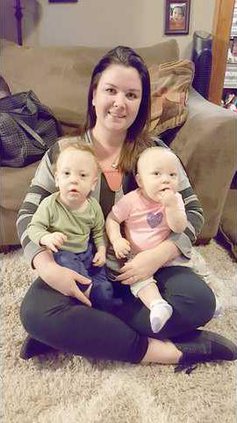Sunflower’s Early Education Center began working with Charlie and Judah Smith shortly after the infants’ release from a neo-natal intensive care unit.
The twins were 12 weeks premature, which put them at established risk for developmental delay and automatically eligible for EEC services.
Today, Charlie and Judah are thriving, thanks to the EEC, said their parents, Stacy Nowlin and Zack Smith.
The EEC staff wanted to share the family’s story in observance of the Week of the Young Child, which runs from April 24-28.
“The staff at the EEC started by helping us learn how to encourage the children to roll over,” Nowlin said. “Charlie had some tightness in her neck that had prevented this.
“After she and her brother were able to roll over and play on the floor, we moved on to crawling,” she continued. “Charlie is now up and walking and Judah is close behind.”
The EEC also has helped Judah with feeding concerns “and now we know more about when to introduce new foods,” Nowlin added.
Sunflower visits the family’s home in La Crosse to provide therapies. At first, the visits were weekly; now they are once or twice a month.
If the non-profit agency was not available “we would have to travel for these services,” said Zack Smith. “We would be driving to doctors’ and therapists’ offices all the time with new questions.
“And since the services are free, we can make sure the children get what they need without a financial burden,” he added. “The early ed center reassures us about what to expect as the twins grow up. We are getting a head start on their development.”
McKinley Phillips, EEC early childhood special education teacher, has been collaborating with the family since the twins were 5 months old.
They were born at 28 weeks gestation with low birth weights, which made them automatically eligible for EEC services. They are now 17 months old.
“Premature births can sometimes result in developmental delays during the first two years of life,” Phillips said. “Charlie and Judah are thriving as they meet developmental milestones with the support of our multi-disciplinary team. In addition to helping with their motor skills, we share nutritional expertise so the twins continue to maintain healthy weights.
“Just as important, we have been connecting with their parents from day one,” she added. “We are here to answer their questions today, as well as prepare them for needs they might have in the future. Stacy and Zack have been great partners throughout this journey.”
Preemie referrals
Preemies are automatically referred to Sunflower for a variety of reasons. Factors include weeks of gestation; low birth weight; intubation; extended oxygen use; extended hospital stays; and/or history of seizures.
The Sunflower EEC staff, which consists of ECSE teachers, physical therapists and speech-language pathologists, collaborates to find the best services for children and families, said Heather Quillin, Sunflower children’s services coordinator.
“Our specialists bring a high level of professionalism to families’ needs,” Quillin said. “But our expertise is just part of it. We build relationships with families, which is crucial to all early intervention services. We find the best fit for everyone involved.”
The EEC is the only place in central Kansas that offers these comprehensive early intervention services and coaches parents to be active participants, Quillin noted.
“The EEC works closely with the family to address their concerns, as well as coach them on ways to promote their child’s development,” Quillin commented. “We work extremely hard to empower parents to be active teachers in their child’s life.
“So much happens between EEC visits, when caregivers have the opportunity to teach their children. We will do all we can to help them overcome or diminish delays. If we can empower parents, many children may no longer need services when they leave the EEC.”
The EEC, which is part of the tiny-k network in Kansas, serves children from birth to age 3. Its service area includes Barton, Pawnee, Rice, Rush and Stafford counties. For more information, call 620-792-4087.





